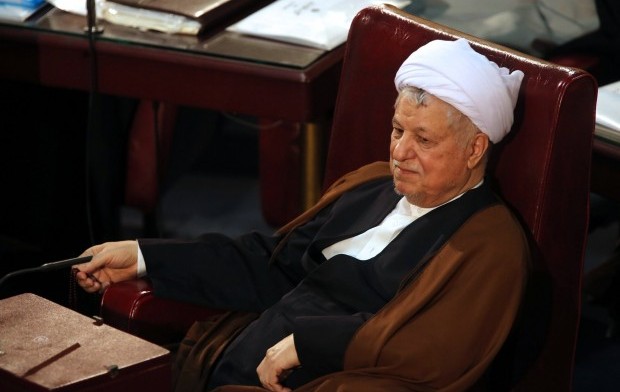
Former Iranian president Akbar Hashemi Rafsanjani attends a meeting of Iran’s Assembly of Experts in Tehran on March 5, 2013.(AFP PHOTO/ ATTA KENARE)
London, Asharq Al-Awsat—Hashemi Rafsanjani, Chairman of Iran’s Expediency Council, warned that radical elements in both the Iran and the US are pushing to repeal the historic Geneva nuclear deal signed between Tehran and the P5+1 group of nations last month.
Hosting a group of university students at his office on Saturday, Rafsanjani emphasized that “the people [of Iran] will not let the radicals destroy the hope that has emerged out of the Geneva accord”.
Referring to the additional sanctions that have been brought against new individuals and companies connected to Iran by the US Treasury Department, Rafsanjani said that hard-liners in Iran and the US are seeking to annul the Geneva accord.
“[President] Obama is also under pressure by the radicals and is being asked to explain why Washington signed the deal with Iran in Geneva,” Rafsanjani added.
Praising the university students’ activism and awareness, Rafsanjani told the students that Iran had managed to escape from the “cul-de-sac of sanctions and war [during Ahmadinejad’s presidency] to a new era of stability” thanks to their efforts.
Rafsanjani also referred to the robust and unshakable support given by Supreme Leader of Iran Ayatollah Ali Khamenei to the Iranian negotiating team.
“Were it not for the support, appreciation and assistance of the Supreme Leader, the radicals would have damaged the government and the negotiating team”, Rafsanjani said.
Rafsanjani also stressed that “the removal of the evil of war and the unfreezing of some of Iran’s assets were the most important achievement we obtained without giving away anything substantial”.
Speaking on Saturday, Swedish Foreign Minister Carl Bildt did not rule out the European Union taking the decision to relax sanctions on Iran in January.
“”I would hope we would see the lifting of the sanctions in January. I see no reason against it,” Bildt told Reuters on the sidelines of a World Policy Conference.
Commenting on the US move to impose new sanctions on Iranian companies and individuals, Bildt described the decision as “not particularly helpful.” However he also attempted to play down the significant of the decision, adding that “I don’t think the problems in Vienna were problems. That was overblown.”
EU foreign ministers are set to meet next week to discuss a proposal from EU foreign policy chief Catherine Ashton on easing sanctions.
